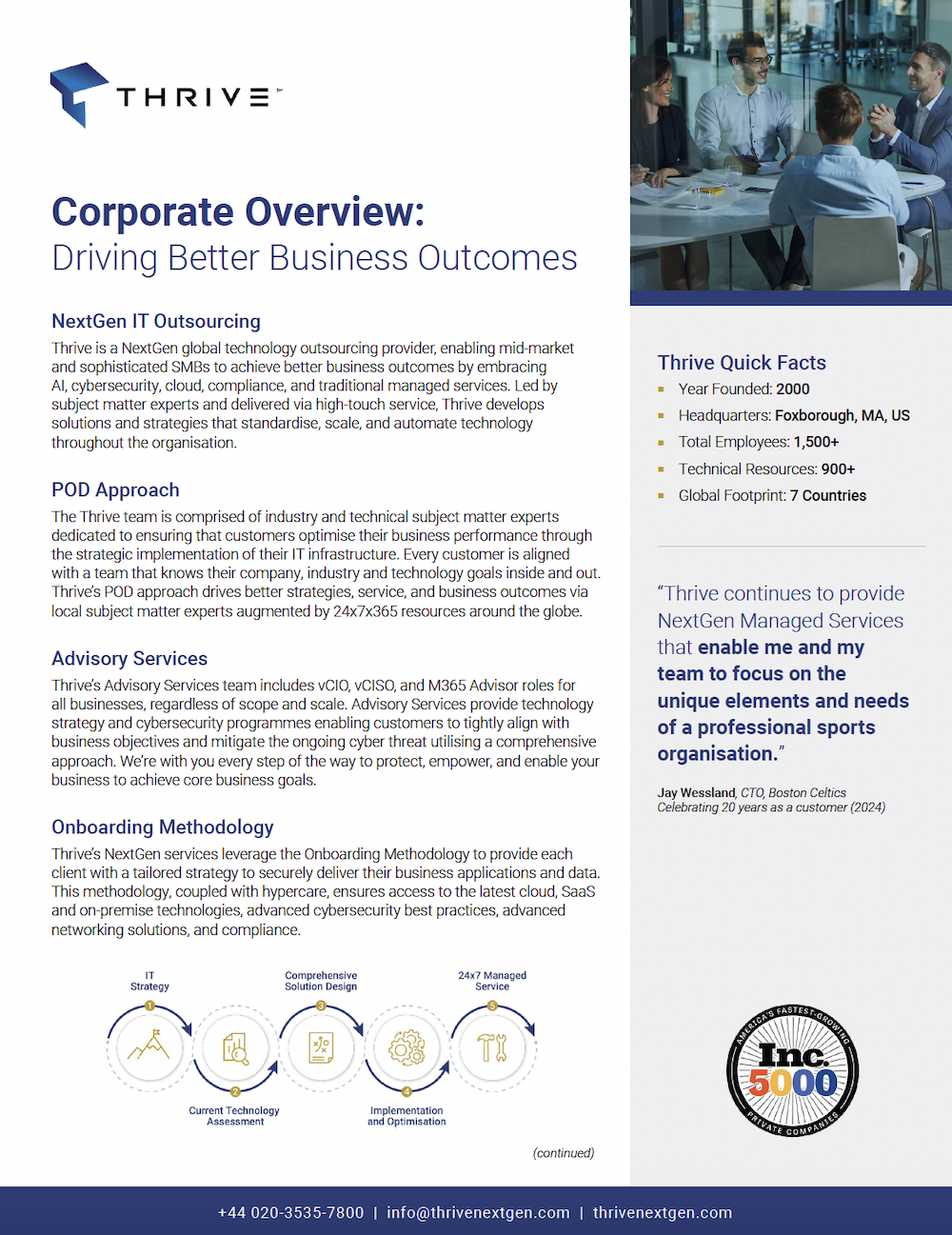UK Compliance
Why Compliance Matters for UK Businesses
- Protecting Sensitive Data
- Avoiding Legal and Financial Penalties
- Building Customer Trust and Competitive Advantage
- Adapting to an Evolving Regulatory Landscape
- Supporting Operational Integrity
- Mitigating Industry-Specific Risks:
How Thrive Can Help
Thrive offers scalable, secure IT solutions tailored to meet the unique needs of UK organisations. Our expert team is trained to help your operations run smoothly and efficiently. We optimise your infrastructure for flexibility and growth, empowering you to focus on what matters most.
With Thrive’s continuous monitoring and reporting, you gain real-time insights into your IT environment. This enables system protection and alignment with UK regulations, providing you with peace of mind.
Note: Nothing herein shall constitute legal advice, compliance directives, or otherwise. Customers and prospective customers should consult a solicitor and/or other compliance professional regarding their organisations’ compliance obligations, including, without limitation, the regulations described herein.

Key Regulations in the United Kingdom
Adhering to international, and local cybersecurity and data regulations is crucial for UK businesses to protect sensitive customer data and maintain trust. Compliance with these regulations also helps UK organisations to operate seamlessly while mitigating the risk of cyber threats.
Cyber Essentials (CE)
Cyber Essentials is a UK government-backed cybersecurity certification scheme designed to help organisations protect themselves from common cyber threats. It’s particularly relevant for UK businesses as it can enhance security posture, boost customer confidence, and help businesses meet regulatory requirements.
Key requirements include:
- Boundary Firewalls
- Secure Configuration
- User Access Control
- Malware Protection
- Patch Management
Cyber Essentials Plus (CE+)
Cyber Essentials Plus builds upon the foundation of Cyber Essentials, offering a more comprehensive approach to cybersecurity. It’s ideal for organisations handling sensitive data or those seeking a higher level of assurance.
Key requirements include:
- Penetration Testing
- Security Group Policy
- Secure Network Design
- Incident Response and Recovery

Driving Better Business Outcomes
“In today’s landscape, cybersecurity is non-negotiable, especially for organisations like ours. Thrive’s pragmatic approach and willingness to listen ensured that our cybersecurity journey wasn’t just a one-time endeavor, but the beginning of a long-term strategic partnership focused on keeping us ahead of emerging threats.”
Andrew Jones
Chief Financial Officer
Zeus Capital
General Data Protection Regulation (GDPR)
The GDPR is a European Union regulation that applies to any organisation processing personal data of EU residents, regardless of location. Key requirements include: data subject rights, data breach reporting, potential DPO appointment, privacy by design, and organisational accountability. UK organisations must comply with the GDPR to avoid significant fines and reputational damage.
Key requirements include:
- Obtaining explicit consent
- Ensuring data security
- Providing individuals with the right to access and erase their data
- Notifying authorities of breaches
Data Protection Act (2018)
The Data Protection Act 2018 is a comprehensive law that governs the processing of personal data in the UK. It’s designed to protect individual privacy and ensure businesses handle personal information responsibly.
Key requirements include:
- Data Subject Rights
- Data Breaches
- International Data Transfers
- Data Protection Officer (DPO)
- Privacy Impact Assessments (PIAs)
- Record-Keeping: Maintaining accurate records of processing activities.
- Data Protection by Design and Default
- Data Protection Principles
Digital Operational Resilience Act (DORA)
DORA is a European Union regulation designed to enhance the operational resilience of the financial sector. It mandates that financial institutions, including banks, insurers, and investment firms, as well as third-party ICT service providers operating in the EU, can withstand and recover from ICT disruptions, including cyber attacks like DDoS and ransomware.
Key requirements include:
- Digital operational resilience testing
- Penetration testing
- Implementing critical plans
- Third-party risk management
- Oversight of critical third-party providers
- Incident response and reporting
- Audit trails and logs
- Governance
- Daily operations
Stay Updated on UK Compliance Trends and Insights
Ready to Simplify Compliance? Let’s Talk.
Compliance Disclaimer
The information on this web page may not be construed or used as legal advice about the content, interpretation or application of any law, regulation or regulatory guideline. Customers and prospective customers must seek their own legal counsel to understand the applicability of any law or regulation on their use of Thrive services. Please also note that the relevant contract(s) between you and Thrive determine(s) the scope of services provided and the related legal terms and this page is provided for reference purposes only, and is not part of, and does not otherwise create or amend, any agreement, warranties, representations or other obligations between you and Thrive. Thrive disclaims any terms or statements contained herein that seek to impose legal or operational requirements on Thrive for the delivery of the services. Customers acknowledge that they remain solely responsible for meeting their legal and regulatory requirements. By accessing this content, customers and prospective customers acknowledge the information provided herein and/or any of the attachments accessible via this page shall strictly be considered as general commentary and nothing herein shall constitute legal advice or otherwise.



